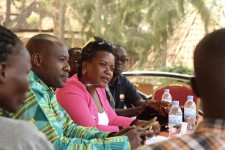Spark Microgrants Team With Partners to Form New Community of Development Practice

NEW YORK, September 11, 2018 (Newswire.com) - As the shortcomings of prescriptive development are shared in forums across the world, Spark Microgrants has announced the formation of a new Community of Practice, uniting the methods and learnings of development partners implementing Spark’s Facilitated Collective Action Process (FCAP) in countries throughout Africa. These partners, while working across a variety of contexts and cultures, together share a basic belief that communities should drive their own local change.
The FCAP, a streamlined village planning process paired with a seed grant, equips villages to plan and launch their own development projects. With 91% project sustainability, and with 87% of communities launching their own independent projects after graduating from the process, the FCAP has now been trialed and adopted by organizations and governments across Africa.
In Ghana and Liberia, Advocates for Community Alternatives and Village Development Fund are piloting the process to increase local capacities, improve advocacy, and provide alternative sources of development financing to communities devastated by extractive mining operations. In Uganda, Community Empowerment for Rural Development (CEFORD) is piloting the FCAP to increase the self-reliance of South Sudanese refugee communities as they prepare for the withdrawal of emergency aid, and in Burundi, FVS-AMADE is using the FCAP to establish inclusive, village level governance. Finally, in Rwanda, Spark is working with government partners to harmonize the process with existing national development plans, creating the foundation for a program that will reach over 12,000 villages and 11 million lives in the next five years. An official from the Government of Rwanda recently noted that "the FCAP is a springboard that propels Rwandan citizens to improve their own lives and participate in our national development programs."
Working across development, governance, vulnerable population protection, and advocacy, this new community of practice will share tools and best practices for using the FCAP, build a body of knowledge and evidence around its efficacy and support other groups and donors as they shift their efforts and transfer decision making opportunities and resources to the communities they serve.
Source: Spark MicroGrants